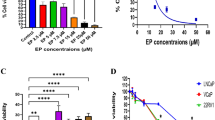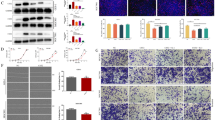Abstract
Uroplakin 1A (UPK1A) is a specific marker of mammalian urothelium and one of major proteins contained in urothelial plaques. Many recent studies reported that UPK1A could be useful marker for diagnosis, detection and prognostic prediction of transitional cell carcinoma. However, relatively little is known about its exact roles in bladder transitional cell carcinoma (BTCC). We tried to explore the roles UPK1A plays in BTCC via the transfection of its antisense nucleotides (AS) into T24 cells to observe their changes of proliferation and apoptosis. After AS was successfully transfected into T24 cells, the percentages of proliferating T24 cells at 24 and 48 h after the treatment were 57.2 ± 6.8 and 44.7 ± 5.2 %, significantly lower than that of control group, as shown by MTT (p < 0.05 and 0.01). At 24 h after transfection of AS, the percentage of apoptotic T24 cells was 26.87 % measured by flow cytometry, significantly higher than that of control group (p < 0.01). Similarly, Hoechst 33258 staining showed that the percentage of apoptotic nuclei of T24 cells after 24 h treated by AS was 28.9 %, significantly higher than that of control (p < 0.05). The most common and typical morphological changes of apoptosis, including shrink, pyknosis and karyorrhexis of T24 cells nuclei and DNA fragmentation were seen from Hoechst 33258 staining and DNA agarose gel electrophoresis. Taken together, inhibition of UPK1A can suppress proliferation and enhance apoptosis of BTCC T24 cells, suggesting it a potential target to treat this disease.




Similar content being viewed by others
References
Siegel R, Ma J, Zou Z, Jemal A. Cancer statistics, 2014. CA Cancer J Clin. 2014;64(1):9–29. doi:10.3322/caac.21208.
Jung I, Messing E. Molecular mechanisms and pathways in bladder cancer development and progression. Cancer Control J Moffitt Cancer Center. 2000;7(4):325–34.
Holmang S, Hedelin H, Anderstrom C, Johansson SL. The relationship among multiple recurrences, progression and prognosis of patients with stages Ta and T1 transitional cell cancer of the bladder followed for at least 20 years. J Urol. 1995;153(6):1823–6 (discussion 6–7).
Pawinski A, Sylvester R, Kurth KH, Bouffioux C, van der Meijden A, Parmar MK et al. A combined analysis of European Organization for Research and Treatment of Cancer, and Medical Research Council randomized clinical trials for the prophylactic treatment of stage TaT1 bladder cancer. European Organization for Research and Treatment of Cancer Genitourinary Tract Cancer Cooperative Group and the Medical Research Council Working Party on Superficial Bladder Cancer. J Urol. 1996;156(6):1934–40, (discussion 40–41).
Sylvester RJ. Natural history, recurrence, and progression in superficial bladder cancer. Sci World J. 2006;6:2617–25. doi:10.1100/tsw.2006.404.
Wu XR, Kong XP, Pellicer A, Kreibich G, Sun TT. Uroplakins in urothelial biology, function, and disease. Kidney Int. 2009;75(11):1153–65. doi:10.1038/ki.2009.73.
Lobban ED, Smith BA, Hall GD, Harnden P, Roberts P, Selby PJ, et al. Uroplakin gene expression by normal and neoplastic human urothelium. Am J Pathol. 1998;153(6):1957–67. doi:10.1016/S0002-9440(10)65709-4.
Romih R, Korosec P, de Mello W Jr, Jezernik K. Differentiation of epithelial cells in the urinary tract. Cell Tissue Res. 2005;320(2):259–68. doi:10.1007/s00441-004-1005-4.
Sun TT, Liang FX, Wu XR. Uroplakins as markers of urothelial differentiation. Adv Exp Med Biol. 1999;462:7–18 (discussion 103–114).
Olsburgh J, Harnden P, Weeks R, Smith B, Joyce A, Hall G, et al. Uroplakin gene expression in normal human tissues and locally advanced bladder cancer. J Pathol. 2003;199(1):41–9. doi:10.1002/path.1252.
Li SM, Zhang ZT, Chan S, McLenan O, Dixon C, Taneja S, et al. Detection of circulating uroplakin-positive cells in patients with transitional cell carcinoma of the bladder. J Urol. 1999;162(3 Pt 1):931–5.
Wu RL, Osman I, Wu XR, Lu ML, Zhang ZF, Liang FX, et al. Uroplakin II gene is expressed in transitional cell carcinoma but not in bilharzial bladder squamous cell carcinoma: alternative pathways of bladder epithelial differentiation and tumor formation. Cancer Res. 1998;58(6):1291–7.
Daniel PT, Sturm I, Ritschel S, Friedrich K, Dorken B, Bendzko P, et al. Detection of genomic DNA fragmentation during apoptosis (DNA ladder) and the simultaneous isolation of RNA from low cell numbers. Anal Biochem. 1999;266(1):110–5. doi:10.1006/abio.1998.2929.
Kageyama S, Yoshiki T, Isono T, Tanaka T, Kim CJ, Yuasa T, et al. High expression of human uroplakin Ia in urinary bladder transitional cell carcinoma. Jpn J Cancer Res Gann. 2002;93(5):523–31.
Moll R, Wu XR, Lin JH, Sun TT. Uroplakins, specific membrane proteins of urothelial umbrella cells, as histological markers of metastatic transitional cell carcinomas. Am J Pathol. 1995;147(5):1383–97.
Yuasa T, Yoshiki T, Isono T, Tanaka T, Okada Y. Molecular cloning and expression of uroplakins in transitional cell carcinoma. Adv Exp Med Biol. 2003;539(Pt A):33–46.
Xu X, Sun TT, Gupta PK, Zhang P, Nasuti JF. Uroplakin as a marker for typing metastatic transitional cell carcinoma on fine-needle aspiration specimens. Cancer. 2001;93(3):216–21.
Okegawa T, Kinjo M, Nutahara K, Higashihara E. Value of reverse transcription polymerase chain assay in peripheral blood of patients with urothelial cancer. J Urol. 2004;171(4):1461–6. doi:10.1097/01.ju.0000118648.29024.b7.
Osman I, Kang M, Lee A, Deng FM, Polsky D, Mikhail M, et al. Detection of circulating cancer cells expressing uroplakins and epidermal growth factor receptor in bladder cancer patients. Int J Cancer. 2004;111(6):934–9. doi:10.1002/ijc.20366.
Yuasa T, Yoshiki T, Isono T, Tanaka T, Hayashida H, Okada Y. Expression of transitional cell-specific genes, uroplakin Ia and II, in bladder cancer: detection of circulating cancer cells in the peripheral blood of metastatic patients. Int J Urol Off J Jpn Urol Assoc. 1999;6(6):286–92.
Wyllie AH. Glucocorticoid-induced thymocyte apoptosis is associated with endogenous endonuclease activation. Nature. 1980;284(5756):555–6.
Slagsvold HH, Marvik OJ, Eidem G, Kristoffersen N, Paulsen RE. Detection of high molecular weight DNA fragments characteristic of early stage apoptosis in cerebellar granule cells exposed to glutamate. Exp Brain Res. 2000;135(2):173–8.
McConkey DJ, Lee S, Choi W, Tran M, Majewski T, Lee S, et al. Molecular genetics of bladder cancer: emerging mechanisms of tumor initiation and progression. Urol Oncol. 2010;28(4):429–40. doi:10.1016/j.urolonc.2010.04.008.
Pazarentzos E, Mazarakis ND. Anticancer gene transfer for cancer gene therapy. Adv Exp Med Biol. 2014;818:255–80. doi:10.1007/978-1-4471-6458-6_13.
Acknowledgments
This work was supported in part by China Scholarship Council (File No. 201306375022).
Conflict of interest
None of the authors have any conflict of interest.
Author information
Authors and Affiliations
Corresponding author
Rights and permissions
About this article
Cite this article
Zhu, H., Tang, Y., Zhang, X. et al. Downregulation of UPK1A suppresses proliferation and enhances apoptosis of bladder transitional cell carcinoma cells. Med Oncol 32, 84 (2015). https://doi.org/10.1007/s12032-015-0541-y
Received:
Accepted:
Published:
DOI: https://doi.org/10.1007/s12032-015-0541-y




